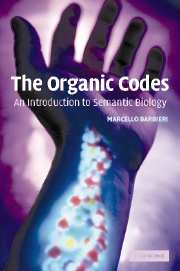Book contents
- Frontmatter
- Contents
- Foreword
- Dedication
- Acknowledgements
- Introduction
- Chapter 1 The microscope and the cell
- Chapter 2 Theories of evolution
- Chapter 3 A new model for biology
- Chapter 4 Organic codes and organic memories
- Chapter 5 The origin of life
- Chapter 6 Prokaryotes and eukaryotes
- Chapter 7 The Cambrian explosion
- Chapter 8 Semantic biology
- Chapter 9 A brief summary
- Appendix: Definitions of life
- Afterword
- References
- Index
Chapter 3 - A new model for biology
Published online by Cambridge University Press: 23 November 2009
- Frontmatter
- Contents
- Foreword
- Dedication
- Acknowledgements
- Introduction
- Chapter 1 The microscope and the cell
- Chapter 2 Theories of evolution
- Chapter 3 A new model for biology
- Chapter 4 Organic codes and organic memories
- Chapter 5 The origin of life
- Chapter 6 Prokaryotes and eukaryotes
- Chapter 7 The Cambrian explosion
- Chapter 8 Semantic biology
- Chapter 9 A brief summary
- Appendix: Definitions of life
- Afterword
- References
- Index
Summary
This chapter describes a mathematical model of epigenesis, and starts by translating the traditional but vague definitions of that concept into expressions that are increasingly more precise. The first step consists in defining epigenesis as a convergent increase of complexity. The second states that this process is equivalent to a reconstruction from incomplete information, and in the third step this becomes a reconstruction from incomplete projections. In this way, we can model epigenesis as a special case of the problem of reconstructing structures from projections, a problem that arises in many fields (for example in computerised tomography) and whose mathematics is well known. What is less well known is that a reconstruction can be achieved even when the starting information is incomplete, provided that appropriate memories and codes are employed. This is illustrated with a few practical examples, and the logic of that unusual kind of reconstruction is described first in words and then in formulae. At that stage we can go back to biological epigenesis and conclude that a convergent increase of complexity in organic life necessarily requires organic codes and organic memories. And this gives us the two critical concepts that will be used in the rest of the book for an entirely new approach to the problem of biological complexity.
The logic of embryonic development
The discovery of genes that control embryonic development has started a true revolution in biology, both from an experimental and from a theoretical point of view.
- Type
- Chapter
- Information
- The Organic CodesAn Introduction to Semantic Biology, pp. 67 - 92Publisher: Cambridge University PressPrint publication year: 2002



